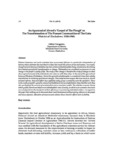Please use this identifier to cite or link to this item:
https://cris.library.msu.ac.zw//handle/11408/1833Full metadata record
| DC Field | Value | Language |
|---|---|---|
| dc.contributor.author | Tarugarira, Gilbert | - |
| dc.date.accessioned | 2016-10-07T10:03:40Z | - |
| dc.date.available | 2016-10-07T10:03:40Z | - |
| dc.date.issued | 2015 | - |
| dc.identifier.issn | 1815-9036 | - |
| dc.identifier.uri | http://hdl.handle.net/11408/1833 | - |
| dc.description.abstract | have accustomed Africans to a particular interpretation of history which celebrates the view that it is ideas that mould the actions of men and women. As a result, the agricultural history of Zimbabwe has been written with philosophies being considered as the driving force behind agricultural transformation or change. Philosophies are considered as precursors to any change in the people’s quality of life. The study of that change is therefore the study of changes in ideas about agriculture and of the individuals who came up with these ideas. In the case of the agricultural history of Rhodesia (Zimbabwe), Alvord the agricultural philosopher is considered to have been wholly instrumental in initiating agricultural changes. This study however argues that in as much as Alvord initiated reforms, these were efforts by a capitalist ruling group to primarily serve the capitalists. Those in his small group felt a genuine sense of self-fulfillment and accomplishment, they liked the work they did, and they had the security of social position and accumulated wealth. The orthodox economic theory which guided Alvord was based on an individualistic view of society, in which socio-economic structures were analysed from the standpoint of their efficiency in maximizing individual welfare. It is argued in this paper that nothing can be discussed about rural development without giving reference to the people and issues of power, allocation of resources and culture; hence Alvord’s efforts were in futility. | en_US |
| dc.language.iso | en | en_US |
| dc.publisher | Midlands State University | en_US |
| dc.relation.ispartofseries | The Dyke;Vol. 9, No. 2; p. 15-32 | - |
| dc.subject | Western historians, social scientists, agricultural history, Zimbabwe | en_US |
| dc.title | An appraisal of Alvord’s ‘gospel of the plough’ on the transformation of the peasant communities of the Gutu district of Zimbabwe: 1926-1960. | en_US |
| dc.type | Article | en_US |
| item.languageiso639-1 | en | - |
| item.fulltext | With Fulltext | - |
| item.grantfulltext | open | - |
| item.openairetype | Article | - |
| item.openairecristype | http://purl.org/coar/resource_type/c_18cf | - |
| item.cerifentitytype | Publications | - |
| Appears in Collections: | Research Papers | |
Files in This Item:
| File | Description | Size | Format | |
|---|---|---|---|---|
| gutudisctrict.pdf | Full Text | 13.94 MB | Adobe PDF |  View/Open |
Page view(s)
96
checked on Apr 5, 2025
Download(s)
118
checked on Apr 5, 2025
Google ScholarTM
Check
Items in MSUIR are protected by copyright, with all rights reserved, unless otherwise indicated.



